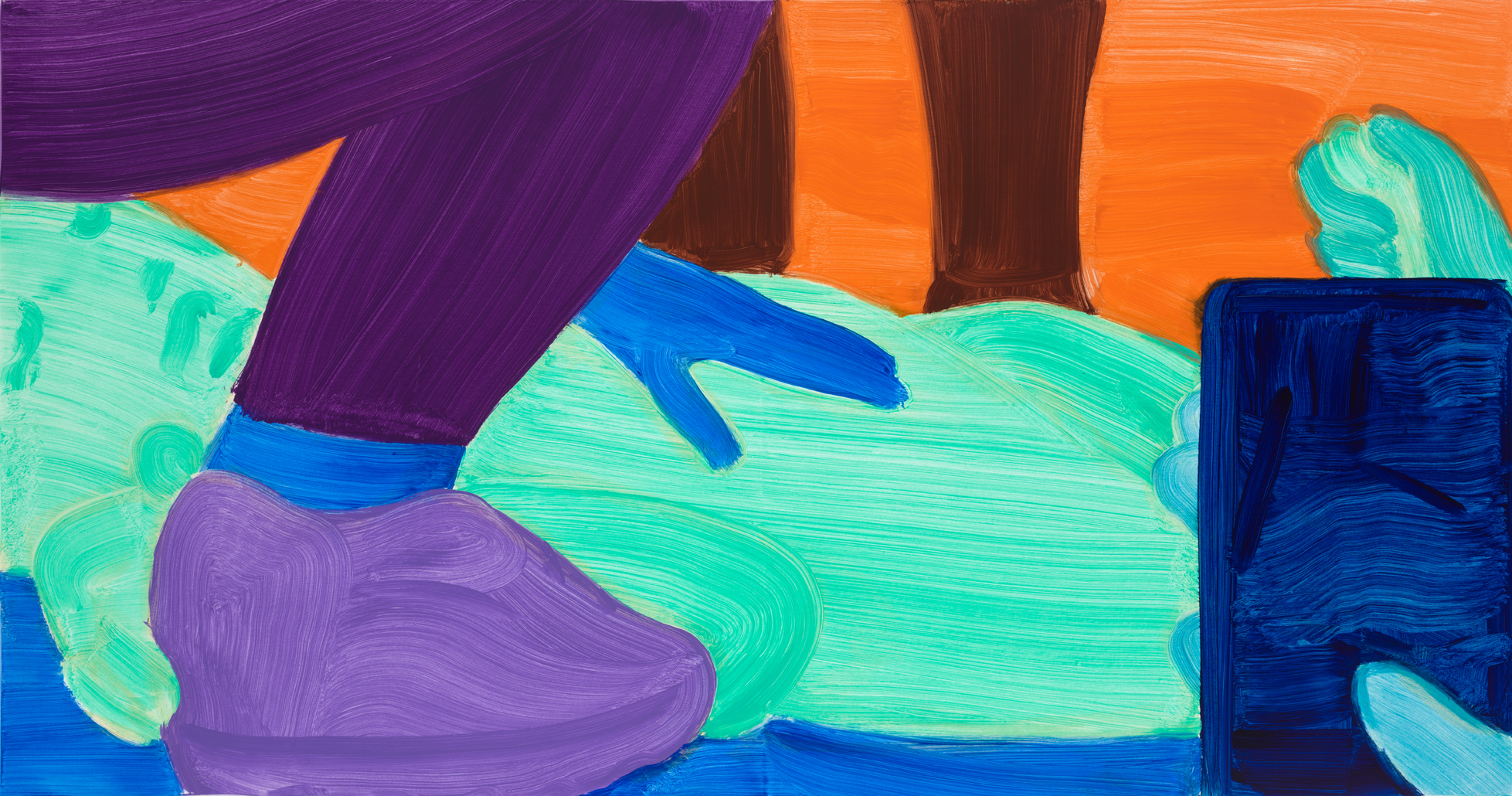I sat down with the consummate writer and poet Ocean Vuong to discuss olfactive influences in his work. The author of two New York Times bestsellers, the poetry collection Time is a Mother and the novel On Earth We’re Briefly Gorgeous, speaks to how scent—especially at home in New England—is a marker of decay and rebirth occurring side-by-side. It’s the screaming advent of spring in concert with the acrid dying and curing of tobacco. Vuong is almost democratic about the confluence. There is aromatherapy in rotting books! It calms him that “mildewy, musty smell of time and knowledge” found in a used bookstore. Vuong’s storytelling around his olfactive memories occupies and punctuates imagination. His recollections contain labor and ritual: moving apartments and cleaning the residual smoke stain on the ceiling from daily incense burning; heating Burger King patties in their wrappers on the hood of a car in summer; putting on a disguise of drugstore perfume to line up at the welfare office; preparing a fire to welcome someone home.
» SCENT IS VERY IMPORTANT TO MY WORK. A LOT OF THAT GETS LOST IN POEMS BECAUSE POEMS ARE ABOUT DEBRIS. «
FOLIE: What are some of your earliest memories involving scent?
OCEAN: The earliest memories would be from the tenement buildings in Hartford, where I grew up. The thing about that is, other than maybe linoleum and Clorox—which was often used to clean—there was no consistency in smells. I don’t know if it makes good perfumery, but that’s the early memory of living in a tenement. It was very clinical. You think about Clorox. You think about bug spray. Mice traps. Very chemical, and those memories are mixed with various smells of cooking from the immigrant communities embedded in Hartford—Jamaican, Guyanese, Vietnamese from our household, Puerto Rican, and Italian cuisine. Those would be the earliest memories: chemicals and food. Which is somehow quintessentially American to me.
FOLIE: If we were to go further back in time and space… As your own poetry pulls from a lineage of people, I wonder how you would olfactively carry your ancestors with you?
OCEAN: The most pervasive smell is incense—cinnabar, joss sticks. Various East Asian incense. Nag Champa-ish. That might be the most consistent scent because incense is burned at any point of rest during the day. In the morning, my parents and grandmother would burn incense. Or when you come home, after shopping, the first thing you do is burn incense. It is almost like a checkpoint throughout the day in a Vietnamese household. It’s interesting because it becomes the dominant force. But also the smoke—you smell the smoke first and then the incense begins to come. The smoke is also the after effect to the point when almost every Vietnamese household would have a burn mark on the ceiling from the continuous stream of incense. So any time we moved from an apartment, we would have to scrub or repaint that part over. I think that would be—when we think about that culturally—the most consistent smell: bringing the incense into the tenement.
» TO ME, THE SCENT OF WOOD SMOKE, SPECIFICALLY IN FEBRUARY, IS SO INDICATIVE OF WHAT I THINK OF WHEN I THINK OF JOY AND WHAT IT MEANS WHEN SOMEBODY MAKES A FIRE FOR SOMEBODY IN WINTER. «
FOLIE: Yes, that moment, too, where incense meets paint or cleaning products. In a more general sense, but still thinking about memories, what enriches your life? What brings you joy?
OCEAN: I’m a New Englander. There’s nothing like smelling the remnants of a wood smoke on a winter evening. There’s a metallic almost iron sense of coldness, rust-like scent of winter. There’s so much water in New England. There’s no dry season. So water becomes a very major scent, and how water changes through the seasons. That, mixed with wood smoke being such a pervasive scent throughout the day, to me, there’s nothing like that scent to bring me back home. When you’re outside in the winter, and you smell the smell of wood smoke, you immediately want to go home, no matter where you are. And you think of home—you text your mother, you text your friends, you start to locate yourself with a destination. The sense of community that everybody is burning something for their homes; everybody is preparing for someone to come home from a day’s work, from a long travel, from hiking, from even walking the dog. To me, the scent of wood smoke, specifically in February, is so indicative of what I think of when I think of joy and what it means when somebody makes a fire for somebody in winter.
FOLIE: To expand on home, within any rituals and routine are there other ways that your day might be accompanied or arrested by smell? Especially, when you are alone and no one is watching, what type of smells rise up?
OCEAN: There’s nothing to me like the smell of used books. When I think of home and my life specifically, I almost never buy new books. I go into used book stores—at this point it’s Pavlovian—and I just calm down. When I travel and when I get anxious, I just go into a used bookstore and just sit there and read a little bit.
» I LIKE TO DEFINE MY WORK AS A BALANCE BETWEEN GRIT AND GRACE. A LOT OF THAT IS IMBUED WITH WORKING CLASS, NEW ENGLAND ETHOS AND IMMIGRANT, WORKING CLASS ETHOS. «
I don’t know what it is—you guys might know more—but for some reason all the books start smelling the same way. Maybe it’s different now with acid-free paper, but I think around the 10-year mark, if the book sits on your shelf for about 10 years, it starts to get that smell. I can’t describe it. Once you go to a used bookstore, it’s a concentration of that. Also, it’s compounded by the people that have used it and carried it over. The compression of that scent is now equated to the compression of knowledge and possibility. So sometimes I would just open a book, an old book like I have here, this 1950’s edition of D.H. Lawrence’s Lady Chatterley’s Lover. I read this in college in a new edition, but I just keep this *smells book* and it’s right there: that mildewy, musty smell of time and knowledge. There’s nothing like it. I know Flaubert was famous for having rotten apples in his drawer. I just prefer rotting books.
FOLIE: Could you walk me through the olfactive elements that were adjacent to the creative process for one of your poems, such as “Someday I’ll Love Ocean Vuong”?
OCEAN: Poems are hard. For example with “Someday,” a lot of the initial instigators of the lines have been lost because that poem is what I call a Frankenstein poem. It comes out of about 6 failed poems. So what I’ll do is I’ll look at a bunch of poems that are not doing their job and I’ll rescue the good lines. Then I’ll move those and consolidate them into a “super poem”. So you lose a lot of the context. It’s almost like salvaging debris, where you go back to the junkyard and you don’t know where these things are coming from but you can use this rusty bar for your sculpture. So a lot of its smell is lost.
With the novel, it’s more intact, so maybe I can answer that question through the novel, through scenes. I’ve realized when I travel the country on tour, I learned there’s something very specific to New England in that you can smell spring happening. I went on a summer tour a few years ago for the novel in June and the places were all pleasant in their own ways, but there was so much stasis. Like LA, to me, smells like sun and dust and air. When I came back to New England, I got to the airport and I could smell things growing. It was water.
FOLIE: Yes, you can smell the ground breaking.
OCEAN: Yeah, because there’s such a short window to grow, everything has learned to grow very fast. The scent of growth—the sweetgrass, the sassafras, the clovers—are all released at once. That’s very important to me as a writer, even as a metaphor. You realize, in this region, there’s the traditional scent of floral. Lilac, for example. They’re here, but they’re not here alone. They’re in conjunction with the smell of everything that grows—a blade of grass, the scent of cut grass. I’ve learned that the scent of cut grass is actually a chemical that the grass releases to tell those around it that it’s being cut. It’s a kind of warning.
FOLIE: Like a scream.
OCEAN: That’s what it feels like. Spring screams here olfactively. It’s a screaming season. I think that’s what I wanted to capture in the novel. Patiently show tobacco and that rural tradition in Connecticut and New England. When the tobacco is curing, around the 3-week mark, we would light pie tins full of coal and place them on the dirt floor beneath the hung tobacco to speed up that drying process. There’s that certain sweet, acrid sharpness to it that is so distinctive to the region. So there’s death—the tobacco dying and curing—and there’s life, happening side-by-side. I couldn’t make it up. It’s the ultimate metaphor for so much of what I do. I arrived [in New England] by happenstance. Nobody picked to immigrate here, but this happens to be such a perfect place where the microcosm of life and death arrives in such an olfactorly way.
» I LIKE SMELLS THAT I CAN DEFINE. I CAN SAY: AH, THAT COMES FROM THE EARTH. IT COMES FROM SOMEWHERE. I KNOW THIS. THIS IS AN EXTRAPOLATION OF SOMETHING KNOWN. «
Scent is very important to my work. A lot of that gets lost in poems because poems are about debris. But the novels are intact. There’s that scene with Trevor and Little Dog warming up their Burger King burgers in wrappers on the hood of the car while the field is just ignited. That, for example, is so specific. It’s about juxtaposition. A lot of my work is about contrast and how everything works like a bas-relief. There’s no competition. Nothing is fighting against anything else. They all work in conjunction to elevate each other. So themes, images, and scents are in collaboration.
FOLIE: Before we close, I want to hear from you if there are any smells that you are disinterested in?
OCEAN: It might come as a surprise—I don’t know, I’m projecting. Most people might think I love saccharin, sweet-smelling things. But I don’t. Maybe it’s an Asian thing because the biggest compliment in Asian dessert is that it’s not too sweet. That’s the highest compliment. I like to define my work as a balance between grit and grace. A lot of that is imbued with working class, New England ethos and immigrant, working class ethos. I try to shy away from overly sweet, floral scents. It’s too overpowering to me. I prefer pine, cedar, oak, wood smells.
Thinking about memory and the past, I grew up in working class communities of color and the most readily available scent was drugstore perfume. I’m not an expert in this and I can only describe it as being “perfumey”. There’s something so overpowering and sad. You go into the welfare line at the welfare office and every family has put on their best, most expensive drugstore perfume to go beg for money. There’s a cloud of sadness in relation to that. I can’t describe the very specific scent of otherworldliness. You can’t pinpoint it. You can’t say it smells like some flower. I think the idea of that kind of perfume is to create a total otherworldly sensation that cannot be reached or defined by its wearer. Maybe that’s its power. You put on something otherworldly and you feel otherworldly, so it gives you the courage to beg the government for money.
So, I like smells that I can define. I can say: “Ah, that comes from the earth. It comes from somewhere. I know this. This is an extrapolation of something known.” That and AXE Body Spray, which is the horror of my high school. AXE Body Spray is the trigger of my high school traumas.
FOLIE: Scent in that way is not so dissimilar from language. Vapid entities that we can’t quite pinpoint. Yet can assault you one moment and conjure these incredible memories the next.
OCEAN: I can hear it being sprayed on. It’s a very particular type of person who wears AXE Body Spray.
FOLIE: *laughs*. This was such a joy. Deep thank you, Ocean. We’ll send scent samples in a few weeks. You can start to test out and sit with the different variations. It may be a little like a poem, where we’ll need to find and pull out the best lines.
OCEAN: I think it’s about composition and Frankenstein-ing. Mary Shelley got it right. I think Mary Shelley was writing an artist statement.



